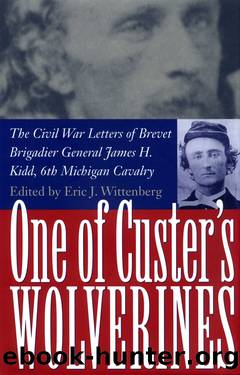One of Custer's Wolverines by Eric J. Wittenberg

Author:Eric J. Wittenberg [Wittenberg, Eric J.]
Language: eng
Format: epub
ISBN: 9781612772547
Barnesnoble:
Publisher: Kent State University Press
Published: 2013-11-04T00:00:00+00:00
6
Missing the End of the War
General Sheridan is accomplishing much & I should like to share the honor.
KIDD SPENT THE WINTER of 1864â65 in Winchester, presiding over a court-martial board. He now proudly wore a gold âCuster badge,â presented to him by the officers of the 6th Michigan Cavalry and issued at the behest of the Boy General himself. The badges, made by the Tiffany Company of New York, consisted of a gold Maltese cross with Custerâs name inscribed on it and topped off by a single gold brigadierâs star. Only upon Custerâs specific request would a man receive the badge, and it was quite a symbol of pride and honor for those lucky enough to wear one. When Kidd received his, he said, âThe gold in this badge is not more precious, it is not rarer, than the frankness, the generosity, the want of distrust which has always characterized your intercourse with me.⦠The associationsâthe Michigan Brigade of Cavalry, its leader, Custer, his deeds and theirs, are enough to make your gift one of inestimable value always.â1
Despite Kiddâs obvious pride at the esteem in which Custer held him, Kidd was very unhappy and made no secret of it, making multiple requests to be relieved of his unhappy duty and sent back to his regiment. These requests were all rejected.
As Kidd brooded over the rejections, George and Libbie Custer hosted a âMichigan Brigade Ballâ at a local school, York Academy. âThe occasion paired local ladies of unionist persuasion and Custerâs subordinates. As snow drifted down outside, the officers and their partners waltzed the night away to the accompaniment of the Michigan Brigade band.â2 It is not known whether the pouting Bob Kidd attended the event. His father did not help things, writing, âI have been expecting daily to see you at home to make us a visit. Other officers came home. I did not see why you would not come and at least spend a few days.â3
In the meantime, Sheridan prepared for the destruction of Earlyâs remaining forces, which were camped near Waynesborough at the head of the Shenandoah Valley. Torbert was away from the army on a leave of absence, and Merritt assumed command of the Army of the Shenandoahâs Cavalry Corps. Kidd would not miss Torbert, whom he did not care for, but he respected Merritt a great deal. Not long after the end of the war, he praised Merritt profusely: âDuring the many hotly contested cavalry engagements, from Upperville and Aldie to Five Forks, he was not accustomed to view the progress of the battle from a distance, but plunged into the fray, encouraging his men by actual presence, and would not hesitate to place himself at the head of a single squadron for a charge, even when commanding a division. By his coolness and intrepidity in action, he won for himself an enviable reputation, and enjoyed a high degree the confidence of Gen. Sheridan.â4
Merritt also held a high opinion of Kidd, and asked Sheridan to reconsider the decision to keep Kidd on the court-martial panel.
Download
This site does not store any files on its server. We only index and link to content provided by other sites. Please contact the content providers to delete copyright contents if any and email us, we'll remove relevant links or contents immediately.
| Automotive | Engineering |
| Transportation |
Machine Learning at Scale with H2O by Gregory Keys | David Whiting(4313)
Never by Ken Follett(3957)
Urban Outlaw by Magnus Walker(3395)
OPNsense Beginner to Professional by Julio Cesar Bueno de Camargo(3288)
Sapiens and Homo Deus by Yuval Noah Harari(3071)
Will by Will Smith(2920)
A Short History of Nearly Everything by Bryson Bill(2698)
Hooked: A Dark, Contemporary Romance (Never After Series) by Emily McIntire(2554)
Rationality by Steven Pinker(2364)
Borders by unknow(2315)
The Becoming by Nora Roberts(2202)
Holy Bible (NIV) by Zondervan(2125)
A Short History of War by Jeremy Black(1848)
HBR's 10 Must Reads 2022 by Harvard Business Review(1844)
The One Percenter Encyclopedia by Bill Hayes(1826)
Freedom by Sonny Barger(1801)
Go Tell the Bees That I Am Gone by Diana Gabaldon(1758)
A Game of Thrones (The Illustrated Edition) by George R. R. Martin(1745)
Five Ways to Fall by K.A. Tucker(1742)
